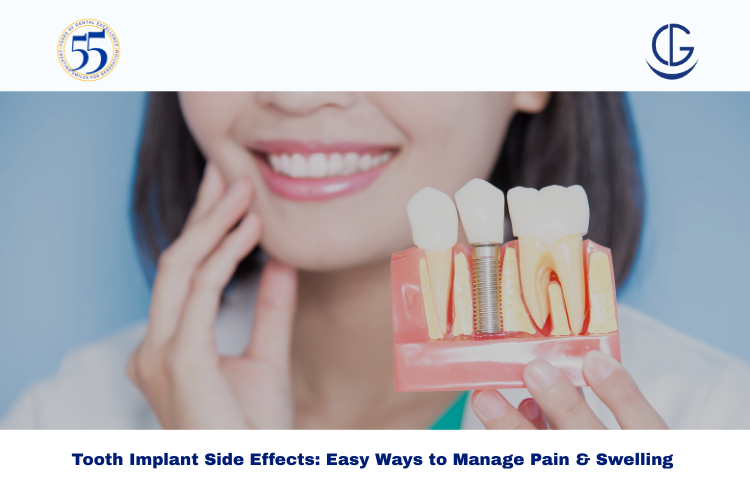Schedule Appointment



Dental implants are a safe, permanent method of replacing missing teeth but like every procedure, dental implants do come with some side side effects. At Dr Gowds Dental Hospital, we have had the pleasure of experiencing thousands of successful recoveries with patients after implants, while accommodating common tooth implant side effects such as pain, swelling and discomfort.
While most patients recover quickly, it’s important to be aware of possible dental implant side effects so you can address them early.
Pain or Soreness – Mild to moderate pain is expected in the first few days after the surgery
Swelling – This is a normal response to surgery and will develop over 48 hours.
Bruising – Some individuals do notice bruising on their gums or cheek.
Minor Bleeding – A little bleeding can be normal in the first 24–48 hours.
Jaw Stiffness – Your mouth may feel tight or sore during opening and closing.
Below are effective, safe, and dentist-approved remedies to ease recovery symptoms. Always follow your surgeon’s aftercare instructions and confirm with your dentist before trying any home treatment.
Benefits: Reduces swelling, numbs pain, and helps minimize bruising.
How to Use:
Precautions: Do not place ice directly on the skin to avoid frostbite.
Benefits: Cleans out the incision site, kills bacteria, and soothes your gum tissue.
How to use:
Precautions: Do not swish forcefully. You do not want to disturb the healing tissue.
Benefits: Prevents irritation and allows the gums to heal without pressure.
How to Use:
Precautions: Keep foods at lukewarm temperature to avoid discomfort.
Benefits: Potentially relieves pain and inflammation.
How to use:
Precautions: Ask yourself any allergy questions or interactions with other medications.
Benefits: Reduced the risk of infection, and facilitates a faster healing time.
How to use:
Precautions: Avoid brushing over stitches until the dentist says it’s ok.
Benefits: Decreases swelling and increases blood flow, promoting healing.
How to Use: Use an additional pillow to keep your head slightly elevated while sleeping, the first 2 – 3 nights.
Precautions: Please do not lie flat for the first part of your recovery.
If you experience mild side effects from the tooth implant, these will usually resolve over a week period, however you should reach out to the dentist immediately if you experience:
At Dr Gowds Dental Hospital, our team are available for urgent care and to make sure your implant heals.
Prevention starts before and after surgery:
Tooth implant side effects such as pain, swelling, and mild discomfort are part of a daily cycle of healing. Applying cold compresses, rinsing with salt water, and sticking to soft foods will make the process more tolerable. In all cases, persistent or severe symptoms require proper assessment by a professional audience.
Thinking about getting dental implants in Hyderabad? Dr Gowds Dental Hospital offers clinically advanced expertise, recovery plans tailored for you, and continuous support for you to smile confidently again.
While full recovery may take several months, the majority of side effects, such as pain and swelling, subside within three to seven days. See your dentist if the symptoms don’t go away after a week.
The best methods to minimize swelling are to apply cold compresses during the first 48 hours, keep your head up, and follow your dentist’s aftercare instructions.
After a week, mild discomfort might still exist, but severe or worsening pain could indicate an infection and need to be evaluated by a specialist.
Yes, both are common short-term side effects that usually go away in a few days with rest and careful attention.